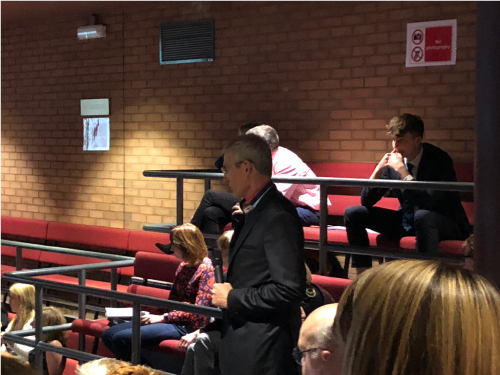Top marks for Cheltenham’s Education debate…
In a week when the Cheltenham Education Partnership , was launched at the Cheltenham Literature Festival and is made up of nine of the town’s schools including state and public establishments which will seek to share resources and expertise for the benefit of all pupils. What better way to kick it off therefore than a panel debate with some of the country’s leading experts, to tackle the question “Is today’s education fit for tomorrow’s world?”
Our MD Angie was delighted to be part of the incubation process for this event, helping to devise the topic and establish the panel with CEO Emma Taylor of Dean Close School. The ‘Education Question Time’ #EduQT began with a student panel debate at 5pm tackling some of the key issues and topics faced by pupils, before distilling the most pressing matters to be debated by a panel of education leaders at 7pm.

Held in the Bacon Theatre at Dean Close School last night, it is fair to say that it was a spectacular evening and a very proud moment for Cheltenham; exactly what we should be recognised for, and obviously demonstrable of the passion and knowledge which goes into the education platform of our town. A student panel from both the public and state schools locally set the sched as students pitched key topics for debate, raising a whole series of issues including a desire to learn and understand more about politics, whether the age of the vote should be lowered to 16, how students can gain more understanding of the economic climate, fostering good mental health through education, and how education can be used to combat the current environmental challenges. It was a lively, well-argued and considered debate, delivered by well-accomplished and passionate young people.
As if heads weren’t spinning enough with the breadth and depth of the pressing topics which young people are passionate to be learning about, it was followed by a reception for VIPs and students, before continuing the evening with an expert panel #EduQT debate. Chaired by broadcaster Jeremy Vine, the panel included The Rt Hon Lord Blunkett, Alex Chalk MP (Cheltenham), Professor Richard Benham, Eleanor Busby, Education Correspondent for The Independent, and Emma Taylor, Warden, Dean Close Foundation. The topics for discussion were distilled from the earlier Pupil Panel and raised by debate chair Jeremy Vine for discussion through the evening.

Perhaps one of the most contested and lively debates, was the topic of the voting age and when young people should have the right to vote. Many students felt that it should be lowered to 16 given that students are passionate, knowledgeable and keen to get involved, while others argued that as you can no longer leave school at 16 for work then there is less support for lowering the voting age.
An interesting response came from Alex Chalk MP who argued that if you want to reconsider voting age, then you need to reconsider the whole UK legislative system to treat young people as an Adult at 16 and therefore taking on all the responsibilities of adults at that point. It would mean considering everything from the age to buy fireworks and use sunbeds, to the age you can drive and sit on a jury. If you are able to vote at 16, then you should be considered an adult and if you are considered an adult, then there are responsibilities you must also take on and which you need to be equipped for.
Also in support for the vote at 16, many students made the point that handheld devices were equipping young people with more information and more varied opinions, which then led neatly into a debate about the influence of screens – are they good or bad? The conclusion was not an easy one, but it became obvious that the devices are here to stay and have pros and cons. What did become clear was that education is essential – teaching young people to use the systems responsibly and equipping them to be knowledgeable about the platforms. Focussing on anti-bullying practice, supporting mental health and resilience and understanding cyber security risk were all high on the list and should be a core consideration for parents and schools alike.
When it comes to the topic of educating for the future and how and what children of all ages should be learning, there was an overwhelming desire from students and teachers alike to bring back soft skills and equip young people with the emotional intelligence and soft skills required to operate successfully in society. Many involved in the debate were concerned about the practicalities of introducing soft skills – school days are shorter, extra-curricular activities are underfunded, and young people don’t have the opportunity to learn these skills elsewhere, but all arguments were overshadowed by an excellent point from Emma Taylor, of Dean Close Foundation who argued that the educational system and lesson curriculum itself needs to be overhauled, so that soft skills are not introduced or taught as a separate lesson or skill, but that the curriculum leaves time for, and teachers are equipped to, make soft skills part of every single lesson, all of the time; an intrinsic part of teaching and education. Students, parents and teachers alike also highlighted a desire for more of the arts in schools, including music and drama, to help create well-rounded individuals.

Perhaps the most interesting of the closing debates was around how and why schools are measured and what impact this has on pupils across all education environments. At the moment, Government measures of ‘success’ in schools are rigidly tied to academic performance, and in being so, heavily encourage investment and focus on academia at the expense of everything else. This combined with funding issues, curriculum changes and time pressures make it difficult for schools to equip their students with necessary all-round skills for life, despite best efforts. It is hoped that the Government introduction of T-Skills will help to alleviate some of the pressures, as vocational learning gains importance, however the students were quick to highlight that this might not have the desired effect. Interestingly, students made the point that they feel let down by the recently updated measurement processes introduced for major exams, because they have made exam results more onerous and less attainable. In the days of old, A and A* grades were considered exemplary, but now the level required to achieve an 8 or 9 during exams is actually higher than the benchmarks of old. The result is that many feel they are underachieving if they attain a 7, which would have been considered excellent in previous models, and that there is student hot-housing by parents and teachers to help students achieve the grades. Ultimately, students were concerned about the mental health impact of unachievable targets, and that the system is creating pupils who are too focussed and not well-rounded enough for the ‘real’ world.
It is impossible to summarise the entirety of the debate, nor are we able to capture the prowess of all those involved. All that remains to be said is huge congratulations to the pupils involved in the debate, the experts on the panel, Dean Close Foundation and particularly Emma Taylor for an exceptional, important and well-executed event. Long may they continue!